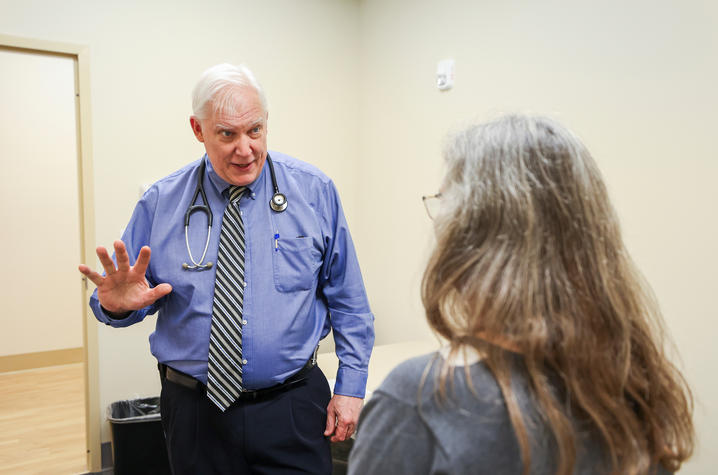Easing agitation and fear: UK researchers study cannabis for late-stage dementia
LEXINGTON, KY. (Jan. 15, 2025) — Researchers at the University of Kentucky (UK) are part of a groundbreaking clinical trial exploring the use of medical marijuana in managing symptoms of late-stage dementia. The National Institutes of Health-funded and Food and Drug Administration-approved LiBBY Study examines the potential benefits of cannabis-derived treatments for addressing agitation and discomfort in patients with advanced dementia, a population with limited palliative care options.
Greg Jicha, M.D., Ph.D., a neurologist and director of clinical trials at UK’s Sanders-Brown Center on Aging, says there is a pressing need for alternative treatments.
“Until we find a cure for dementias, there will always be a stage where the focus shifts to comfort and quality of life,” Jicha explained. “Unfortunately, our current methods — such as sedatives and antipsychotics — often come with significant side effects. We need options that allow patients to remain alert, engaged and cared for at home or in skilled facilities.”
Dementia not only takes an emotional toll on patients, but on their families. Jicha says through his decades of work in the field that is one of the most difficult aspects of the disease.
“There’s nothing more painful to family members than watching their loved one with dementia agitated, fearful or frightful,” he shared. “It really is torture to family members.”
This profound distress often leaves families feeling helpless as they witness a loved one’s struggle with behaviors that can disrupt care and quality of life. By exploring the potential of medical marijuana to alleviate these symptoms, the study aims to offer a new avenue of hope and relief for both patients and their caregivers.
The LiBBY Study is named after a late-stage dementia patient whose lack of treatment options for agitation symptoms motivated the search for potential alternatives, like medical marijuana. The study’s aim is to build evidence-based knowledge about the effects of THC and CBD on dementia symptoms.
“We know that cannabinoid receptors in the brain are tied to emotional regulation,” said Jicha. “This could be an opportunity to bring peace and even improve interactions between patients and their families in the final stages of life.”
The research aligns closely with the expanding role of palliative care at UK, an area spearheaded by Jessica McFarlin, M.D., division chief of UK HealthCare’s Palliative and Supportive Care. The program at UK has grown into one of the most robust in the state, addressing a wide spectrum of serious illnesses.
“This study is not only about dementia alone but is also about advancing palliative care as a science,” McFarlin said. “We need evidence-based treatments to ensure we’re providing the highest quality of care, even in those final chapters.”
For families, the study offers a structured, monitored and science-driven alternative to self-medication.
“Many families are trying CBD or driving across state lines for medical marijuana without knowing its safety or effectiveness,” said McFarlin. “This trial reassures them that there’s a scientific foundation behind what they’re doing.”
Balancing innovation and safety
The trial offers participants access to THC and CBD through an open-label extension after an initial randomization phase, ensuring all enrolled patients can benefit from the study’s findings. It is also one of the first studies to run under Kentucky’s recent steps toward legalizing medical marijuana.
“Patients with late-stage dementia don’t have to wait for state-level legalization,” Jicha noted. “They can gain access now through this study.”
As the newly enacted medical marijuana law continues its roll out across Kentucky, dementia is not one of the medical conditions listed. Researchers are optimistic that the findings of the LiBBY Study could pave the way for dementia to be formally recognized as a medical condition for which cannabis can be prescribed. By building a strong foundation of evidence, the study aims to influence policy changes that would allow patients and their caregivers greater access to cannabis-derived treatments.
“Our hope is that this research will demonstrate the safety and effectiveness of medical marijuana for managing dementia symptoms,” said Jicha. “This could be a turning point in how we approach palliative care for some of the most vulnerable individuals in our society.”
Researchers believe UK is uniquely situated to lead an innovative study of this kind having the University of Kentucky Cannabis Center as a vital resource. The center was established by Kentucky House Bill 604 to advance the study of cannabis and its derivatives and determine the risk/benefit profile for select medical conditions.
“The establishment of the UK Cannabis Center provides us with access to cutting-edge research, expertise and infrastructure that enhance our ability to explore medical marijuana’s potential,” Jicha said. “This collaboration strengthens our efforts to ensure that the science driving this study is rigorous and impactful.”
The partnership highlights the university’s commitment to addressing complex health challenges through multidisciplinary innovation.
A legacy of hope and growth
The study’s namesake, Libby, serves as a poignant reminder of the human impact of these medical advancements. Her case embodies the trial’s mission: to provide patients with dignity, comfort and relief in their final chapters.
“This approach could have been transformational for Libby and her family,” Jicha said. “It’s about giving families options and the confidence that their loved ones are receiving the best possible care.”
With recruitment underway and promising preliminary research, the LiBBY Study marks a significant step forward in dementia care and the broader field of palliative medicine.
“This is just the beginning,” McFarlin stated. “If this trial is successful, it could open doors for using medical marijuana in other end-of-life conditions, offering more choices and hope for patients and families alike.”
For more information on the study, click here.
Research reported in this publication was supported by the National Institute on Aging of the National Institutes of Health under Award Number R01AG068324. The content is solely the responsibility of the authors and does not necessarily represent the official views of the National Institutes of Health.
As the state’s flagship, land-grant institution, the University of Kentucky exists to advance the Commonwealth. We do that by preparing the next generation of leaders — placing students at the heart of everything we do — and transforming the lives of Kentuckians through education, research and creative work, service and health care. We pride ourselves on being a catalyst for breakthroughs and a force for healing, a place where ingenuity unfolds. It's all made possible by our people — visionaries, disruptors and pioneers — who make up 200 academic programs, a $476.5 million research and development enterprise and a world-class medical center, all on one campus.






